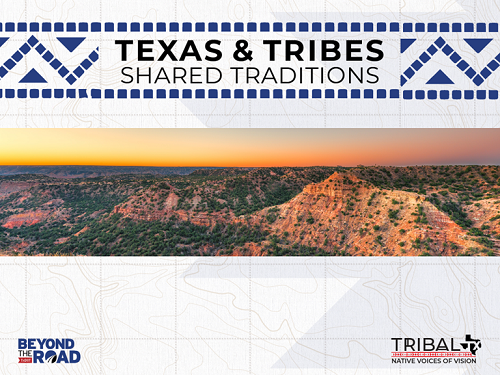To help honor and preserve Native American history in Texas, the Texas Department of Transportation recently highlighted the cultural resources it developed to further bolster its relationship with the 28 federally-recognized tribes connected to the Lone Star state.
[Above image by TxDOT]
As part of that effort, in early 2023, TxDOT published Texas & Tribes: A Shared Tradition to tell the stories of those tribes and their role in Texas history and culture.
“Every day, TxDOT cultural resources staff learn more about Texas history and the people that made homes here, including Native American history, as part of our environmental planning,” explained Rebekah Dobrasko, TxDOT’s cultural resources director, in a statement. “We wanted to publish ‘Texas & Tribes’ to connect people with Texas history and show how Native American tribes played key roles in our history and culture.”
Little known pieces of history fill this book, as hundreds of different tribes lived in Texas for at least 15,000 years before the arrival of Europeans – including the Caddo, Comanche, Apache, Kiowa, Choctaw, Kickapoo and Tonkawa. Today, TxDOT said communities across the state have incorporated many of the early traditions of those tribes, including transportation routes, culinary practices and ways of life.
“We believe it is critical to work with tribal leaders on this history, because knowing these important cultural stories and historic places can help TxDOT plan to avoid them during our transportation projects,” Dobrasko pointed out. “Sharing and honoring this history is important to tribes, and TxDOT is committed to deepening our relationship with our tribal partners.”
Other state departments of transportation across the country are engaged in similar efforts.
For example, one of the newest “next generation” highway rest areas built and maintained by the Iowa Department of Transportation also doubles as a museum of Native American culture.
Traveling northbound on Interstate 29 in western Iowa, the agency’s newest rest area is nestled near the Loess Hills just west of Glenwood and highlights the history of the Native American tribes of that area and how they are connected to what archaeologists call the “Central Plains Tradition.”
Meanwhile, in September, the Wisconsin Department of Transportation highlighted how federal funding is helping the department create a Tribal Technical Assistance Program or TTAP Center for 65 tribal nations across 30 states.
The Traffic Operations and Safety Laboratory or TOPS Lab at the University of Wisconsin-Madison recently received a two-year $625,000 grant from the U.S. Department of Transportation and Wisconsin DOT said it will work with the school to create a TTAP Center to support transportation investments on tribal lands and other tribal initiatives related to training, technical assistance and technology services.
Also, in January 2022, the Colorado Department of Transportation debuted a documentary called “Durango 550: Path of the Ancestral Puebloans” to show how the agency worked with archaeologists and regional Native American tribes to document, study, and ultimately share the discoveries unearthed near Durango in southwest Colorado.


